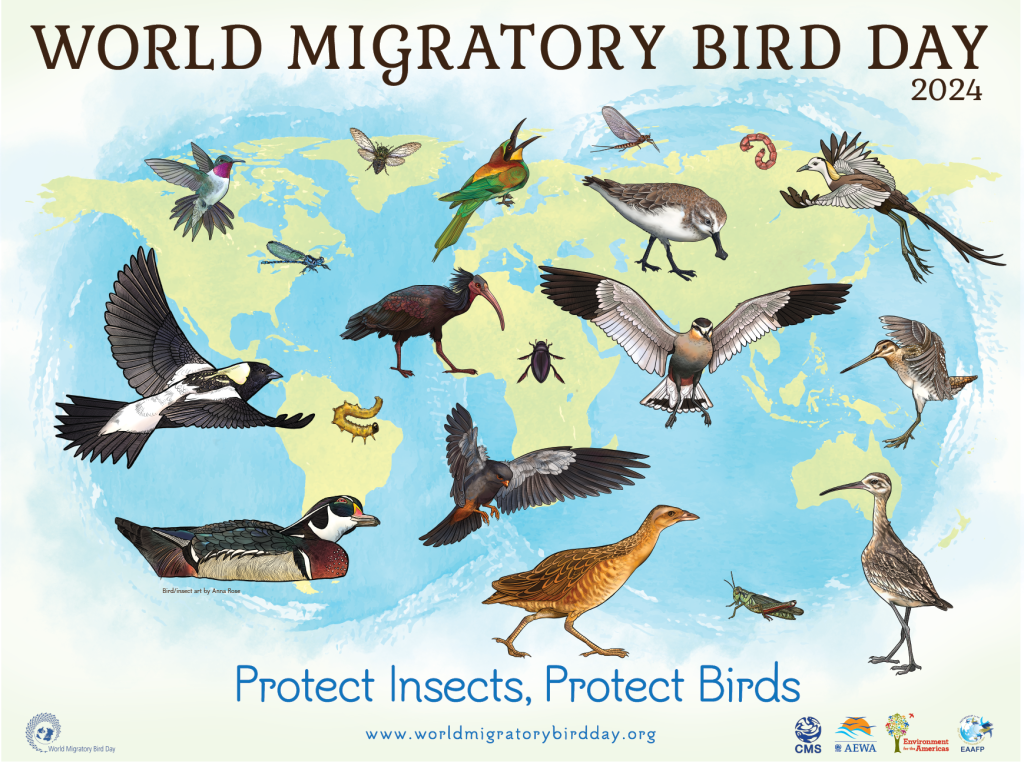Bird migration is a natural phenomenon that has captured the imagination of people across cultures for centuries. These annual journeys involve the mass movement of birds across vast distances, often spanning continents, and are driven by a combination of instinct, environmental cues, and survival strategies. Migration is a complex behavior that serves various ecological, evolutionary, and survival purposes. Yet, the very phenomenon of bird migration is under threat, particularly due to declining insect populations, upon which many migratory birds rely for sustenance.
Insects provide essential energy for migratory birds, offering a rich source of nutrients critical for their survival. They rely on insects for energy during migration and other stages of their life cycles, especially when feeding their offspring. However, the massive decline in insect populations in many parts of the world is having serious implications for migratory birds. This year’s World Migratory Bird Day will therefore shine a spotlight on the interdependence between insects and birds, urging action to protect insects as a means to safeguard avian populations.

Did you know that
- Insects provide the necessary energy for migratory bird species, because they contain remarkable nutrients, providing birds with protein-dense, high-energy sources of food. Migratory bird species depend on insects during migration and at other stages of their life cycles when feeding their offspring.
- The presence of insects greatly influences the timing, duration, and overall success of bird migrations. During stopovers at various locations along their migration routes, birds actively forage for insects in fields, forests, wetlands, and other habitats. They catch flying insects in mid-air, or they search for insects among leaves, bark, and vegetation. Many birds’ journeys coincide with peak insect abundance in their stopover areas.
- This reliance on insects is especially pronounced for species such as warblers, flycatchers, swallows, and swifts. However, many other bird species such as ducks or shorebirds, and some raptors depend on insects during migration and at other stages in their lifecycle, in particular for raising their young before they are able to fly.
- Insect populations are declining globally, and this phenomenon is mirrored by a decrease in populations of birds that depend on insects for their survival.
- Migratory birds bring multiple benefits to humans as insect eaters, providing pest control for mosquitoes, and other insects that may damage crops and spread disease.
- 85 percent of flowering plants require animal pollination; in most cases this job is done by insects. If we lose those pollinators, many plants will struggle to survive, and by extension many migratory birds that depend on them.
- Actions taken to reduce insect declines will benefit birds across their flyways.
- Migratory bird monitoring has shown that insectivorous migrants associated with farmland ecosystems, especially grassland species, have declined considerably (13% on average in Europe during the period 1990-2015).
- Restoring grassland ecosystems, providing support to farmers to secure flower strips and fallow land is vital to restore insect and migratory bird populations globally.
- Close monitoring of migratory birds, using citizen-science tools and raising awareness through environmental educational campaigns, can deliver vital data to restore and manage critical habitats, and ensure their connectivity, for migratory birds.
- Maintaining and/or restoring water bodies is essential to protect insectivorous aquatic communities, including many waterbird species.
- The insect-eating bird diet encompasses a diverse range of insects including: Aerial insects such as flies and mosquitoes, moths and caterpillars, butterflies and beetles, and aquatic invertebrates.
Content above from https://www.worldmigratorybirdday.org
Sierra Leone is a very important stop-over country for migratory birds along the East Atlantic flyway. To keep the stop-over-sites intact and lively is key to protect birds on a global level. Protecting our Mangroves, our coastline and inland lakes is crucial for the survival of migratory birds on their journey between Africa and Europe!



